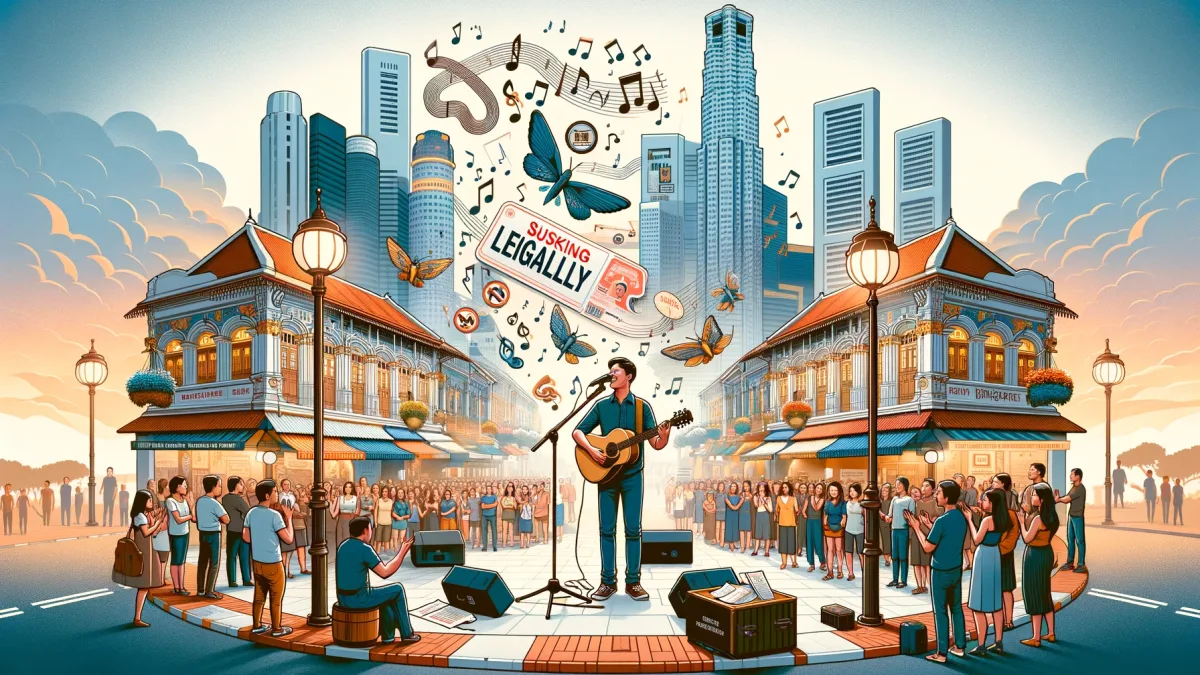Hello, music lovers and shower singers venturing into the public eye (or ear)! Ever found yourself wandering the vibrant streets of Singapore, humming a tune, and wondered if you’re flirting with the fine line of legality? You’re not alone! As a lawyer with a penchant for the lighter side of law, I’m here to harmonize the facts about singing in public in Singapore, so let’s dive into this melodious query.
The Basics: Freedom of Expression vs. Public Order
Singapore is known for its strict laws and regulations, designed to maintain harmony, public order, and decency. But does this extend to singing in public? In short, singing per se is not illegal in Singapore. Like many global metropolises, the city-state celebrates cultural expression and artistic freedom. However, the context, content, and location play pivotal roles in determining whether your public performance hits a legal sour note.
Busking in Singapore: A Symphony of Regulations
For those aspiring to share their vocal talents on the streets, Singapore offers a structured busking scene. Buskers must apply for a license from the National Arts Council (NAC), adhering to guidelines that ensure public performances contribute positively to the city’s vibrancy without disrupting peace or comfort. This process ensures that street performances, including singing, are in harmony with the city’s standards.
Volume and Venue: When Singing Strikes a Chord with the Law
While singing is generally permitted, belting out tunes in residential areas late at night might not be music to everyone’s ears. Singapore’s laws against causing public nuisance or breaching the peace could come into play if your singing disturbs the tranquility of the neighborhood. The Miscellaneous Offences (Public Order and Nuisance) Act addresses behaviors that could harass, alarm, or inconvenience the public, which, yes, could include overly enthusiastic vocal performances at inopportune hours or locations.
Lyrics That Lead to Legal Discord
What about the content of your songs? Singapore places a high value on social harmony and racial and religious sensitivity. Singing songs with potentially offensive, inflammatory, or obscene lyrics could see you facing more than just a disapproving audience. The Sedition Act, for example, prohibits acts, including musical performances, that have the potential to stir up hostility between different racial or religious groups.
Karaoke Conundrums: Singing Safely
Karaoke is a beloved pastime in Singapore, but even here, the law has a say. Venues are regulated, and amidst the COVID-19 pandemic, additional rules were temporarily put in place regarding social gatherings and activities that could increase transmission risk, including singing. Always check the current guidelines to ensure your karaoke plans are not only fun but also fully compliant.
The Legal Harmony: Singing Responsibly
So, can you sing in Singapore? Absolutely! But as with any public expression, doing so responsibly and with consideration for those around you is key. Whether you’re a busker sharing your art or simply someone who loves to sing, understanding and respecting the legal boundaries ensures that your music brings joy, not jeopardy.
Encore: Finding Your Stage
Singapore’s rich cultural tapestry includes numerous legal avenues for performers to express themselves. From licensed busking spots to community events and festivals, there are plenty of stages waiting for your performance. Just remember, the spotlight of legality shines on where, when, and what you perform.
Final Notes: Sing Your Heart Out, Legally
In conclusion, while the streets of Singapore might not be the Wild West of musical expression, there’s ample room for singers to share their talents within the legal framework. By adhering to regulations and respecting community standards, your music can indeed be a part of the city’s bustling, harmonious life.
So go ahead, warm up those vocal cords, and maybe even explore the process of obtaining a busking license. Just keep the legal tune in mind, and your public performances will not only be memorable but also melodiously within the law.









Leave a Reply